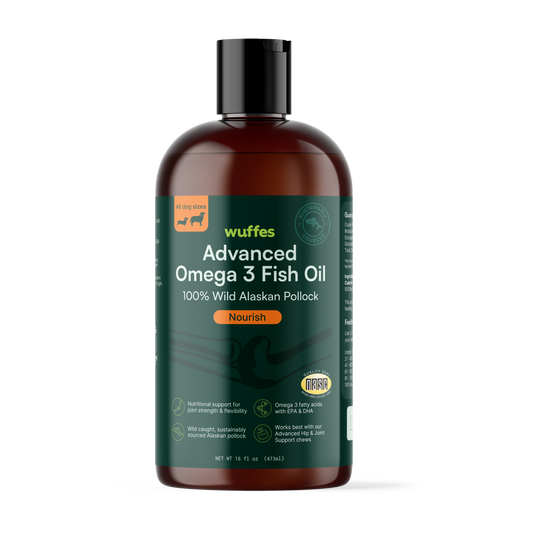The best source of medical advice for your pet is your vet. A veterinarian can provide objective advice based on assessing your pet's health and needs, offering practical information.
Often, dog owners will buy supplements based only on online reviews or recommendations by friends. However, positive reviews do not ensure the purity, efficacy, and quality of the supplement. Unlike medications which are regulated by the FDA, joint supplements are a completely unregulated market. Unless a company voluntarily seeks 3rd party laboratory testing, there is no way to know for sure if the content matches the label claims.
Dog owners, especially those who own large breeds, tend to worry about their dog’s joint condition as larger breeds are generally known to be predisposed to joint issues.
Can joint supplements cure existing joint conditions?
A dog who is already suffering from joint issues will not be cured by supplements. However, joint supplements for dogs can help improve joint comfort. Health conditions that affect joints and bones can be very painful which may cause your dog to limp, avoid certain activities, or have trouble rising.
Veterinarians recommend supplements generally for two purposes: first, to slow the progression of joint issues in dogs; and second, supplements can alleviate occasional joint discomfort.
Joint conditions occur due to various contributory factors such as congenital deformities such as hip dysplasia, prior injury, age, breed, and obesity.
The most common joint issue faced by dogs is arthritis, affecting 20-40% of all dogs. Arthritis occurs when the cartilage – the smooth lining that covers bones – wears down and becomes thinner. As a result, the roughened ends of the bones start rubbing against each other, causing inflammation and, ultimately, pain. Dogs with arthritis often walk with a limp because moving hurts.
Giving dogs joint supplements, as recommended by a vet, can help delay the onset of arthritis or other joint problems. Unfortunately, damaged cartilage doesn’t heal or regenerate on its own like blood cells do, but supplements can help manage discomfort.
Joint supplement ingredients
Essential Fatty Acids (EFAs)
Essential Fatty Acids (EFAs), particularly those found in fish oils, are widely used to support joint health in dogs. Two specific EFAs, DHA (docosahexaenoic acid) and EPA (eicosapentaenoic acid), have shown the most promise in helping dogs with arthritis. Scientific trials have demonstrated that these fatty acids can improve mobility in dogs with joint problems, and some dogs have even been able to reduce their reliance on prescription arthritis medications after incorporating EFAs into their diet.
In addition to their anti-inflammatory properties, DHA and EPA also have antioxidant effects, which can further protect the joints. For dogs with osteoarthritis, recommended doses range from 230 to 370 mg per kilogram of body weight, much higher than dosing recommended for skin health.
Because of these benefits, veterinarians often recommend diets rich in EPA and DHA for dogs with osteoarthritis. Studies suggest that including at least 3.5% fish oil in a dog's diet can lead to improvements in mobility and reductions in lameness.
Cannabidiol (CBD) for Dogs
Cannabidiol (CBD) is a compound derived from cannabis, but has lower levels of THC and thus does not cause the "high" associated with cannabis. Studies suggest that CBD interacts with various receptors in the body, including those involved in pain regulation.
There is growing interest in using CBD to help relieve pain in dogs with arthritis. Although large-scale studies are still needed, some smaller clinical trials conducted by CBD manufacturers have shown positive results, indicating that CBD may help reduce pain and improve mobility in dogs suffering from joint issues. As with any plant product, the proportions of active ingredients can vary widely among brands.
Undenatured Type II Collagen (UC-II ®):
UC-II® is a form of undenatured type II collagen derived from chicken sternum cartilage, often used as a joint health supplement in dogs. Unlike other forms of collagen that are broken down during processing, UC-II® remains intact, allowing it to interact with the immune system to help reduce inflammation and joint discomfort from normal exercise and aging. Specifically, UC-II® works through a process called oral tolerance, which can suppress the immune response that attacks joint cartilage in conditions like osteoarthritis. Clinical studies have shown that UC-II® can improve joint function and mobility in dogs, with some studies suggesting it may be more effective at smaller doses than other joint supplements like glucosamine and chondroitin.
Green-Lipped Mussel (GLM):
Green-lipped mussel is a natural source of omega-3 fatty acids, glycosaminoglycans, and other bioactive compounds beneficial for joint health. Originating from New Zealand, GLM is known for its potent anti-inflammatory properties, which help reduce pain and stiffness in dogs with arthritis or other joint issues. Studies have shown that dogs given GLM supplements experience improved mobility and a reduction in arthritic symptoms. Due to its combination of beneficial compounds, GLM is often included in joint supplements or therapeutic diets for dogs with osteoarthritis.
Chondroitin Sulfate and Glucosamine
These particular ingredients help ease the discomfort that your dog may be suffering from due to joint issues. Glucosamine regulates collagen synthesis in cartilage.
Chondroitin sulfate and glucosamine are commonly used to support joint health in dogs, especially in conditions like arthritis. Glucosamine contributes to the building blocks of cartilage, which cushions the joints.
Chondroitin sulfate works by blocking the enzymes that break down cartilage, helping to keep the joints healthy. When used together, these two ingredients help rebuild and protect cartilage, supporting joint function and reducing pain over time.
When combined, glucosamine and chondroitin assist in the synthesis of building blocks that are essential in forming cartilage. Some dogs might experience mild side effects, like softer stools or gas, when taking these supplements. These usually go away with a small dosage adjustment. It also has anti-inflammatory properties, which effectively reduce occasional pain. Meanwhile chondroitin sulfate acts as an inhibitor of destructive enzymes found in cartilage and joint fluid. When combined, glucosamine and chondroitin assist in the synthesis of building blocks essential in forming cartilage and prevent cartilage breakdown.
Are supplements safe for dogs?
Supplements are not regulated by the Food and Drug Administration as they are not drugs. Most joint supplements can be taken alongside medications without adverse effects. While most supplements cause minimal side effects, it is important to consult with your veterinarian for guidance in the selection of a quality product.













